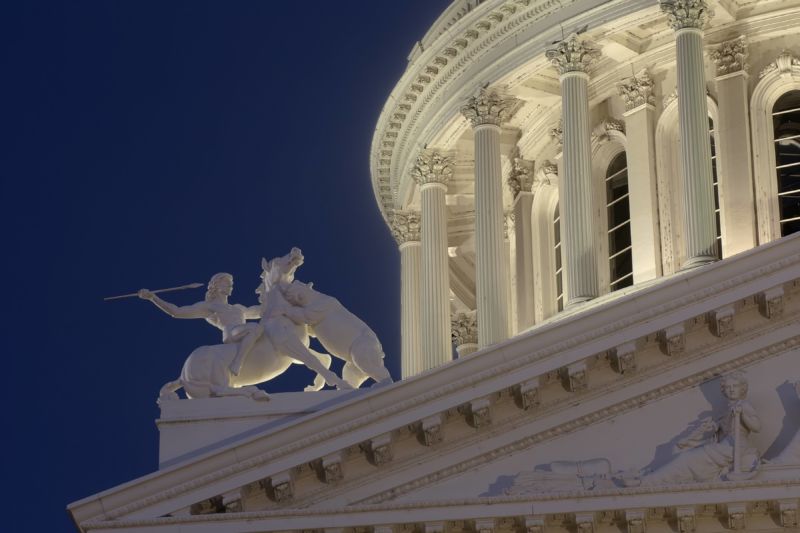
A proposed net neutrality law in California would replace the repealed federal regulations, going beyond the federal rules by banning payments for data cap exemptions. If passed, the bill would ban AT&T's Sponsored Data, Verizon's "FreeBee" data, and any similar programs imposed by home or mobile Internet providers.
The bill would also try to prevent interconnection payment disputes that harm Internet service quality—such as those between Netflix and major ISPs in 2013 and 2014.
The legislation "is the first state-level bill that would comprehensively secure all of the net neutrality protections that Americans currently enjoy," according to Stanford law professor Barbara van Schewick. (The Federal Communications Commission repeal hasn't taken effect yet.)
"The [California] bill prohibits ISPs from blocking, speeding up or slowing down websites, applications, and services; charging online companies for access to an ISP's customers and blocking those that do not pay; and from entering into deals with online companies to put them in a fast lane to the ISP's customers," van Schewick wrote today.
Sen. Scott Wiener (D-San Francisco) consulted with van Schewick on technical matters before introducing the legislation text yesterday. The bill has 14 other coauthors from the state Assembly and Senate.
Some state net neutrality proposals "have just copied the text of the FCC's 2015 net neutrality rules," but the Wiener bill also covers other "important protections [that] were fleshed out in the text of the [FCC's] order," van Schewick wrote.
Van Schewick said the California bill is notable for prohibiting ISPs from charging "access fees" that online services would have to pay in order to send data to broadband consumers. "None of the other [state] bills have done this and it's one of the loopholes that ISPs will use (if it’s not closed) to extract payments from edge providers," van Schewick told Ars.
Although the FCC is trying to preempt state-level net neutrality laws, van Schewick contends that "the bill is on firm legal ground."
Zero-rating
The bill takes a stronger stance against data cap exemptions (or "zero-rating") than the FCC rules did. Exempting specific applications or classes of applications from data caps in exchange for payment would not be allowed.
"An Internet service provider may zero-rate Internet traffic in application-agnostic ways, without violating [the proposed law], provided that no consideration, monetary or otherwise, is provided by any third party in exchange for the provider’s decision to zero-rate or to not zero-rate traffic," the bill says. In order for the zero-rating to be "application-agnostic," it must not "differentiat[e] on the basis of source, destination, Internet content, application, service, or device, or class of Internet content, application, service, or device."
That would prevent ISPs from charging online services for the right to deliver data without counting against customers' data caps. The bill would also protect customers from having to pay more for certain kinds of content by banning "application-specific differential pricing." The bill defines this banned activity as "charging different prices for Internet traffic to customers on the basis of Internet content, application, service, or device, or class of Internet content, application, service, or device."
The repealed FCC rules didn't place any specific restrictions on zero-rating, but the FCC reserved the right to review zero-rating implementations and halt those that harmed Internet users or ISPs' competitors. In the final days of the Obama administration, the FCC concluded that AT&T and Verizon Wireless were violating net neutrality by charging other providers for the same data cap exemptions that AT&T and Verizon provided to their own video services.
But FCC Chairman Ajit Pai rescinded those findings shortly after taking over the chairmanship in February 2017.
If the California bill becomes law, it could prevent paid data cap exemptions in the first place.
Interconnection oversight
Pai's FCC is also abandoning its oversight role for interconnection payment disputes. Under the FCC rules, content providers or network operators that want direct connections to ISPs' networks could file complaints if ISPs make "unjust" or "unreasonable" payment demands.
The California bill doesn't seem to recreate the FCC's complaint process in this respect, but it says that ISPs may not engage in practices related to "ISP traffic exchange that have the purpose or effect of circumventing or undermining the effectiveness of this [law]."
The state Public Utilities Commission would have oversight authority under Wiener's legislation. The bill would also let the state attorney general, district attorneys, or city attorneys bring actions against ISPs that violate the California net neutrality rules.
No state law is likely to replicate all of the consumer protections that are being lost in the FCC's net neutrality repeal. But it would be an achievement just to impose an enforceable law on all ISPs in a state, given the FCC's claim that state net neutrality laws are preempted.
Some states are trying to evade the federal preemption with indirect measures that apply only to ISPs that accept state contracts. No one knows for sure how a court would rule on state bills that regulate net neutrality directly. Even legal analysts who support net neutrality laws disagree on whether such laws would survive lawsuits filed by ISPs.
Van Schewick argues that the FCC's preemption claims are invalid.
"While the FCC's 2017 Order explicitly bans states from adopting their own net neutrality laws, that preemption is invalid," she wrote. "According to case law, an agency that does not have the power to regulate does not have the power to preempt. That means the FCC can only prevent the states from adopting net neutrality protections if the FCC has authority to adopt net neutrality protections itself."
Washington recently became the first state to impose net neutrality rules on all ISPs. There is pending net neutrality legislation in more than half of US states.
reader comments
93